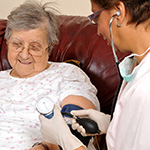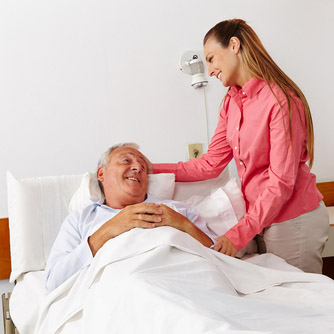Manifestations of Post-Traumatic Stress Disorder
 Exposure to traumatic experiences has been associated with full or partial symptoms of post-traumatic stress disorder (PTSD), depression, panic disorder, generalized anxiety disorder and substance abuse. Holocaust Survivors at the end of life may respond and react differently to everyday activities, sounds, conversations and experiences.
Exposure to traumatic experiences has been associated with full or partial symptoms of post-traumatic stress disorder (PTSD), depression, panic disorder, generalized anxiety disorder and substance abuse. Holocaust Survivors at the end of life may respond and react differently to everyday activities, sounds, conversations and experiences.
Lack of personal safety – It is generally accepted that the greater the exposure to
past traumatic events, the greater the probability of future struggles with depression.
Traumatic experiences have also been associated with somatic symptoms and
physical conditions like chronic pain syndromes, hypertension, insomnia, asthma and
cardiovascular problems. While aging Holocaust Survivors might not explicitly talk
about their traumatic past, they may express many somatic complaints, which need to
be understood as manifestations of both emotional and physical (somatic) traumas.
Personal hygiene—Harsh smells, showering, bathing and being handled roughly
can provoke flashbacks of being pushed and beaten, delousing procedures, horrific
'medical' experiments conducted on camp inmates and even the poisonous gas that
was piped into communal 'showers,' i.e. the gas chambers.
Dehumanization—Clinically necessary shaving, identification bracelets, pre-surgery
markings, pre-procedural line-ups in holding areas and lack of privacy can be reminders
of past losses of dignity, individuality and personhood.
Lack of personal safety—Dogs, alarms, loudspeakers and loud voices were all part of
the attacks and intimidation used against Jews in the camps. Religious symbols, like
crucifixes, were part of the culture of the 'enemy.' Distrust of the medical community
is based on memories of 'selections' (for death) and human experiments performed
by Nazi 'doctors' in the concentration camps. Separation from family members can be
terrifying because, during the war years, family members were forcibly separated, never
to meet again.
Disclosure of personal information—Refusal to share any personal, financial or clinical
information is based on deep mistrust towards anyone who is not immediate family.
In the camps, exhibiting any pathology could bring about being killed immediately.
Advance planning is taboo since 'living' and 'surviving' are of paramount importance.
Download our free Guidebook: Caring for Holocaust Survivors with Sensitivity at the End of Life

This helpful guidebook provides a deeper understanding of end-of-life issues that may manifest in the Holocaust Survivor at the end of life.





